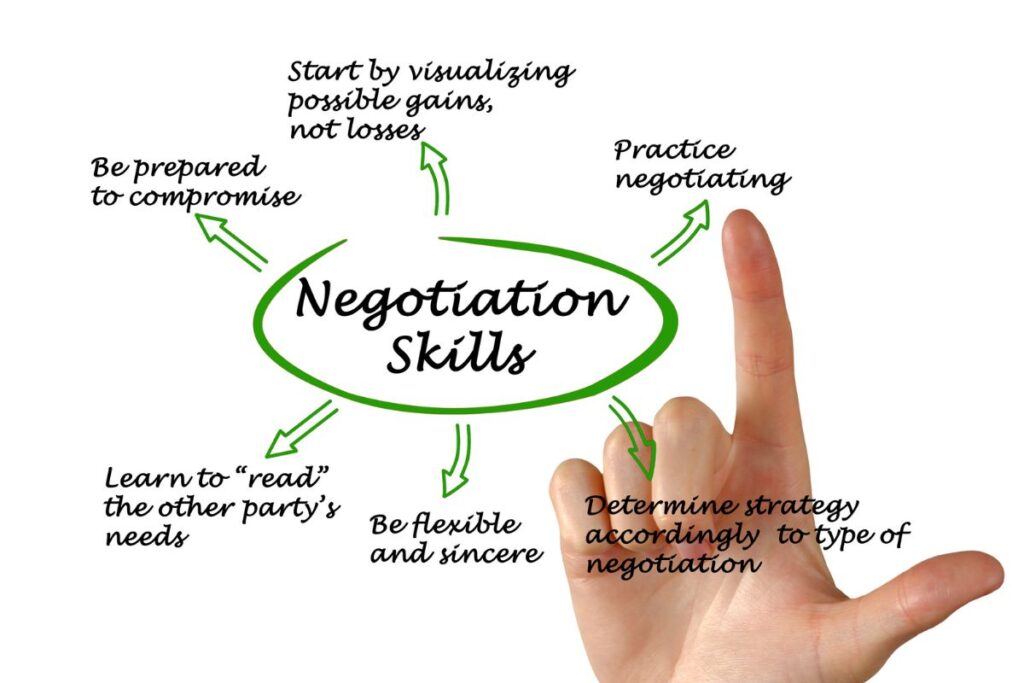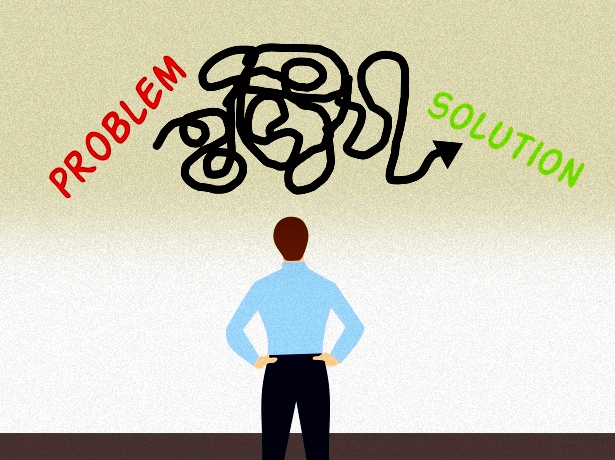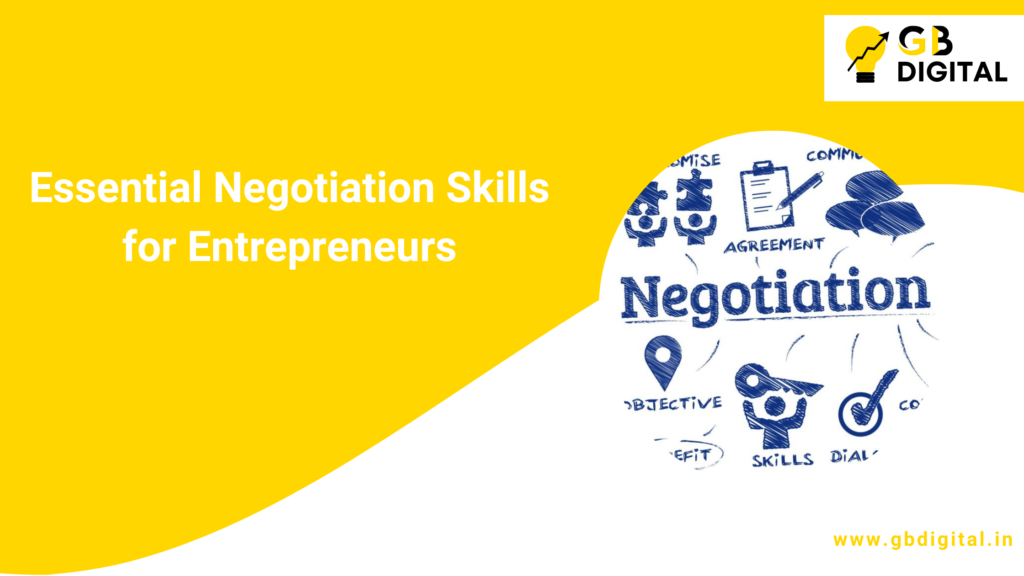Negotiation skills are essential for every entrepreneur. Whether you’re negotiating with suppliers, potential partners, employees, or investors, being able to navigate these discussions effectively can make the difference between success and failure. In fact, mastering negotiation can help entrepreneurs secure better deals, foster strong business relationships, and manage conflicts more efficiently.
This article will explore the key negotiation skills every entrepreneur should develop, how to apply them in various business contexts, and tips for becoming a more effective negotiator. We’ll also dive into expert insights and practical strategies for improving your negotiation game.
1. The Importance of Negotiation for Entrepreneurs
Why Negotiation Matters
Negotiation is at the heart of every business interaction. For entrepreneurs, who often face resource constraints and high-stakes decisions, negotiating effectively is critical. It allows you to:
- Secure better deals: Save money or improve terms with suppliers and partners.
- Build lasting relationships: Effective negotiations can lead to long-term partnerships.
- Resolve conflicts: Skilled negotiators can defuse tense situations and find win-win solutions.

Common Negotiation Scenarios
Entrepreneurs negotiate in a wide range of scenarios, such as:
- Securing funding from investors.
- Setting terms with vendors or suppliers.
- Negotiating salaries or contracts with employees.
- Forming partnerships or collaborations.
2. Key Negotiation Skills for Entrepreneurs
Active Listening
One of the most crucial skills in negotiation is active listening. Often, people focus too much on what they want to say rather than understanding the other party’s needs. Active listening involves fully concentrating on the speaker, understanding their message, and responding thoughtfully.

Tips for Active Listening:
- Don’t interrupt; let the other party finish their thoughts.
- Paraphrase or ask clarifying questions to ensure understanding.
- Pay attention to non-verbal cues, like tone of voice and body language.
Emotional Intelligence (EQ)
High emotional intelligence (EQ) enables entrepreneurs to recognize their own emotions and those of others. This awareness helps manage emotions during tense negotiations and fosters empathy, which can create a more collaborative atmosphere.

How to Improve EQ in Negotiations:
- Stay calm and composed, even in difficult conversations.
- Understand the emotional drivers behind the other party’s positions.
- Use empathy to build trust and rapport.
Preparing and Researching
Thorough preparation is key to successful negotiations. Knowing the details about the deal, the market, and the other party gives you leverage and helps anticipate potential objections.

What to Research Before Negotiating:
- Market rates: Understand industry benchmarks for pricing or salaries.
- The other party: Research their goals, constraints, and negotiation style.
- Your objectives: Clearly define your priorities and what you’re willing to compromise on.
Problem-Solving Mindset
Negotiation should be viewed as a process of solving problems rather than a zero-sum game. Approaching the discussion with a problem-solving mindset helps foster collaboration and find solutions that benefit both parties.

Problem-Solving Tips:
- Focus on interests, not positions. What does each side truly want to achieve?
- Brainstorm multiple solutions to create options.
- Look for trade-offs that allow both sides to walk away satisfied.
3. Advanced Negotiation Techniques
BATNA (Best Alternative to a Negotiated Agreement)
Understanding your BATNA is crucial. This is your fallback option if the negotiation doesn’t reach a favorable outcome. Knowing your BATNA gives you confidence and ensures you don’t settle for a bad deal.

How to Identify Your BATNA:
- List all your alternatives if the deal falls through.
- Assess the pros and cons of each option.
- Strengthen your BATNA by exploring better alternatives before entering negotiations.
Anchoring and Framing
Anchoring involves setting the first offer or price point, which often sets the tone for the negotiation. The initial offer can strongly influence the final outcome.
Framing refers to how you present your offer or argument. Framing in a positive, solution-oriented way can make your proposal more appealing.
Tips for Effective Anchoring:
- Start with an ambitious but reasonable offer.
- Frame your offer as beneficial to both parties.
- Be prepared to justify your anchor with data or rationale.
The Power of Silence
Silence can be a powerful negotiation tool. After presenting an offer or counteroffer, staying silent forces the other party to respond, often leading to concessions or further discussion.
When to Use Silence:
- After making a proposal, to let the other party reflect.
- When the conversation becomes heated, to diffuse tension.
- As a pause before responding to give yourself time to think.
4. Common Negotiation Pitfalls and How to Avoid Them
Focusing Solely on Price
While price is often a key factor in negotiations, it’s essential not to focus exclusively on it. Non-price factors, such as delivery terms, service quality, or future collaborations, can also add value.

Letting Emotions Take Over
Negotiations can become emotional, especially when there’s a lot at stake. However, allowing anger, frustration, or anxiety to dictate your decisions can result in poor outcomes. Stay composed and focus on the bigger picture.
Being Inflexible
Going into a negotiation with a rigid stance is a common mistake. Flexibility is key to finding win-win solutions. Be open to alternatives that still meet your core objectives.
5. Expert Insights and Case Studies
Case Study: Steve Jobs’ Negotiation Tactics
Steve Jobs was known for his effective and often unconventional negotiation tactics. One notable example was when Apple negotiated with record labels to launch the iTunes Store. Jobs used a mix of assertiveness, creativity, and a clear vision to strike deals that allowed Apple to revolutionize the music industry.
Jobs often anchored negotiations by laying out clear terms and expectations, then remained firm until he achieved his desired outcome. His ability to communicate the broader benefits of the deal helped him win over resistant record labels.
6. Future Outlook: Negotiation Trends and Technologies
AI and Data-Driven Negotiations
As AI and data analytics evolve, they are increasingly being used in negotiations. AI tools can analyze vast amounts of data, providing real-time insights into market trends, pricing, and the other party’s behavior. This data can help entrepreneurs prepare better and make more informed decisions during negotiations.
The Rise of Virtual Negotiations
With the rise of remote work and globalized business, virtual negotiations are becoming more common. Entrepreneurs need to develop skills to effectively negotiate via video calls and online platforms. Building rapport through virtual mediums and managing technology-driven distractions are key challenges in this new era of negotiation.
Conclusion
Mastering negotiation skills is essential for entrepreneurs who want to succeed in today’s fast-paced business environment. From understanding the art of active listening to leveraging advanced techniques like BATNA and anchoring, these skills help entrepreneurs navigate high-stakes discussions with confidence and poise.
By consistently refining your approach and learning from each experience, you can become a more effective negotiator, build stronger business relationships, and secure better deals for your startup. Remember, negotiation is not about winning or losing—it’s about finding mutually beneficial solutions that propel both parties forward.
FAQs
Q1. What is the most important skill in negotiation?
Active listening is often considered the most crucial skill in negotiation, as it helps you understand the other party’s needs and respond effectively.
Q2. What is BATNA, and why is it important?
BATNA stands for Best Alternative to a Negotiated Agreement. Knowing your BATNA ensures you don’t settle for a bad deal and gives you leverage during negotiations.
Q3. How can entrepreneurs improve their negotiation skills?
Entrepreneurs can improve by preparing thoroughly, practicing active listening, and learning advanced techniques like anchoring and framing.
Q4. Why is emotional intelligence important in negotiations?
Emotional intelligence helps negotiators manage their own emotions and understand the emotions of others, leading to better outcomes and stronger relationships.
Q5. What is tactical empathy?
Tactical empathy is the practice of showing understanding and empathy toward the other party’s position to build trust and foster collaboration.








